|
11 The Parade
Margate
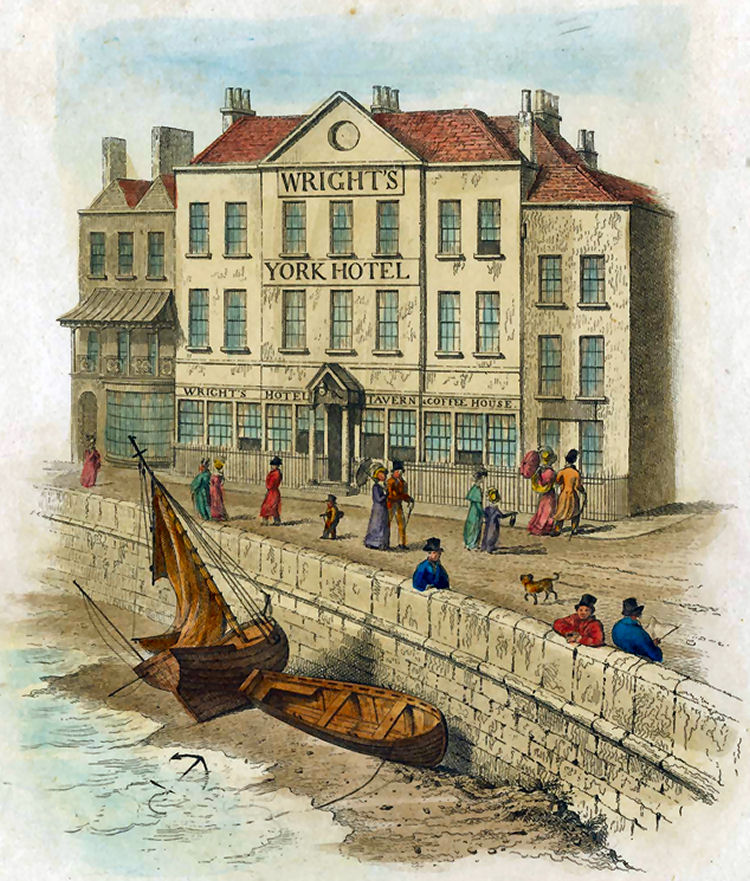
Above engraving 1830s. |
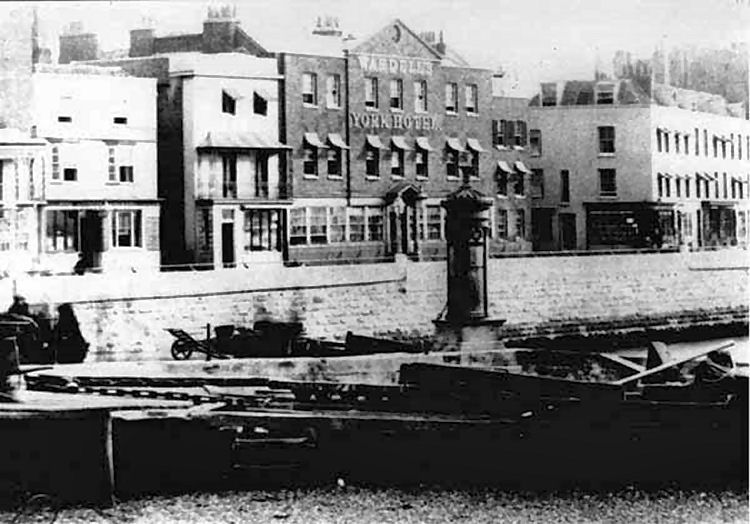
Above photo, date unknown. |
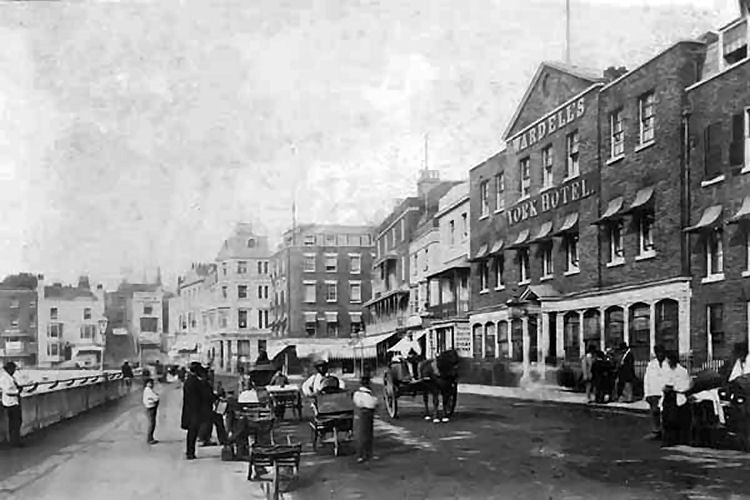
Above photo
date unknown.
|
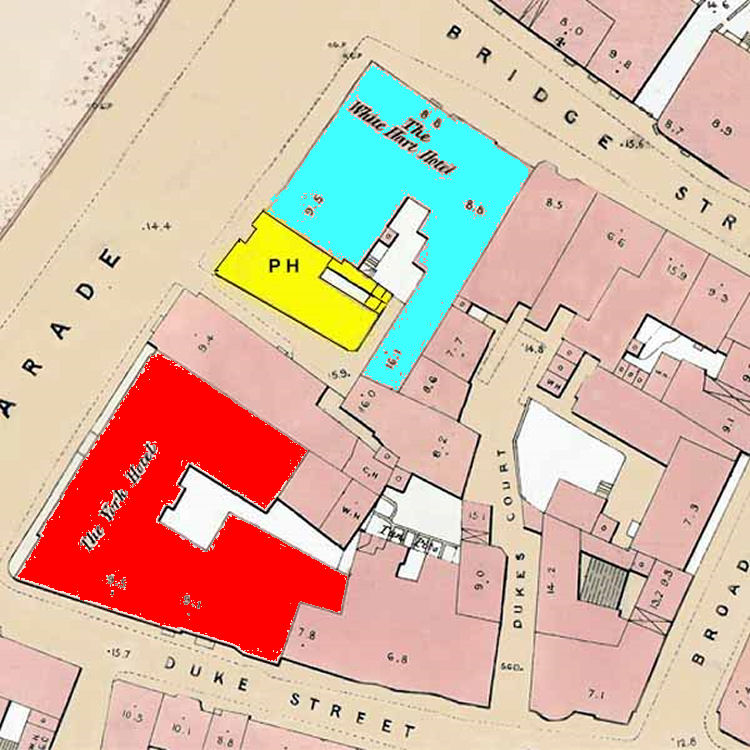
YELLOW="Lord Nelson. RED="York Hotel" BLUE="White Hart Hotel." O S map 1852.
|
Also known as the "Royal York Hotel" in the 1901 census. The original
building was overhauled and remodelled several times including a new 4th
floor and roof.

Above postcard, date unknown, kindly sent by Debi Birkin. |
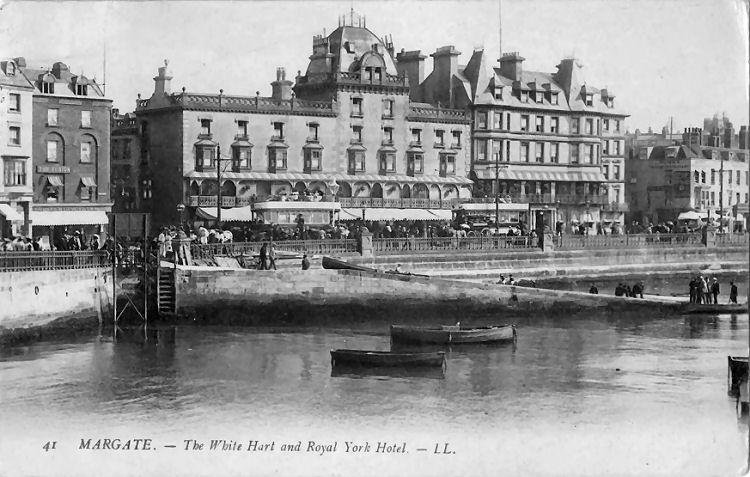
Above postcard, 1906, kindly sent by Debi Birkin. Also showing the "White
Hart." |
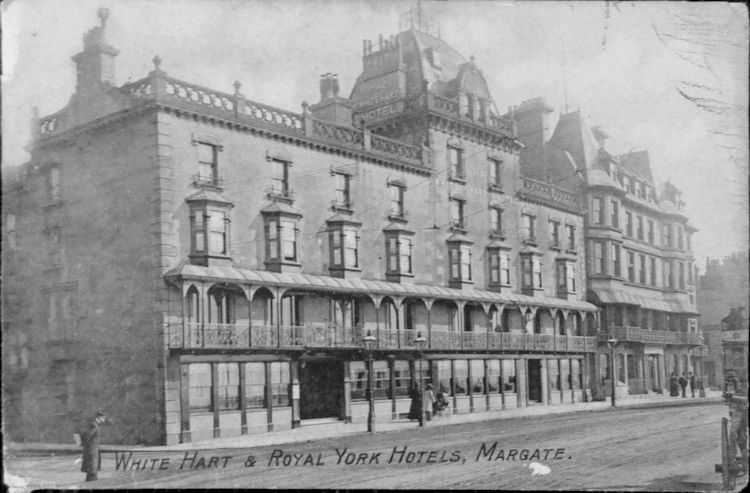
Above postcard, circa 1908, also showing the "White
Hart." |
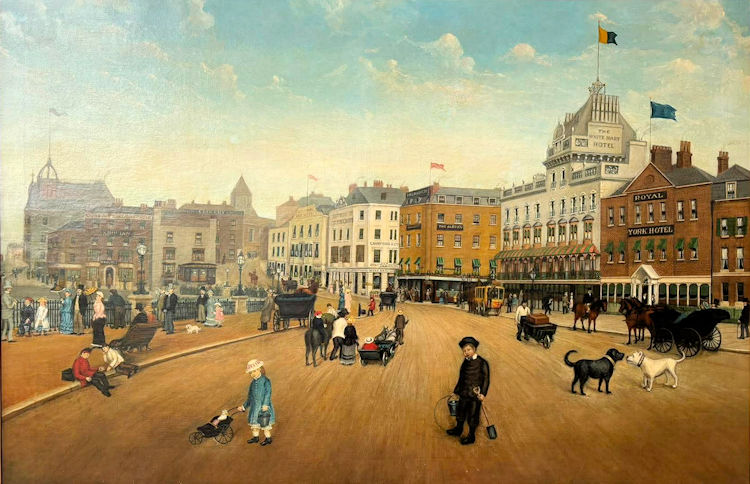
Above painting circa 1920, also showing the "White Hart." |
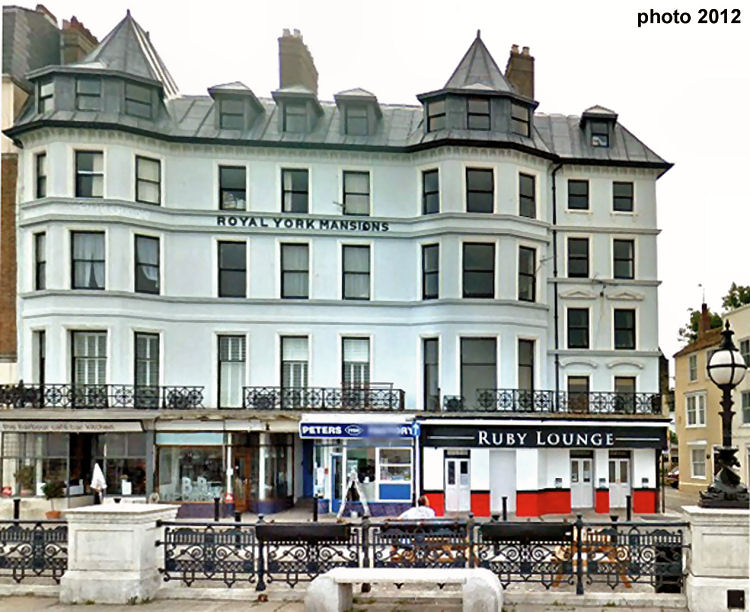 Above
photo 2012, date unknown, kindly sent by Debi Birkin. When it
ceased to be viable as a hotel the top floors were converted into flats
and the building was renamed "Royal York Mansions." |
|
Kentish Gazette 21 January 1800.
On Saturday was married at Margate in this county, Mr. James Warren,
printer and stationer, to Miss Mitchener daughter of Mr. Mitchener,
of the "York Hotel."
|
|
Kentish Gazette 26 February 1802.
Monday was married at Margate, Mr. J. C. Cobb, to Miss. S.
Mitchener, daughter to Mr. Mitchener, of the "York Hotel."
|
|
Kent Gazette Reports 2 July 1805.
MARGATE.
MITCHENER'S YORK HOTEL, ON THE PARADE.
J. MITCHENER respectfully acquaints the Nobility and Gentry, that
the above Hotel is opened for the reception of Families and Single
Gentlemen, on the most liberal terms; the apartments, neatly
furnished, commanding a fine sea prospect.
The Proprietor begs leave to assure those who shall honour the Hotel
with their residence, that his rooms, beds. and linen, shall at all
times be in the most perfect order, and that his highest ambition
will be to merit their patronage and approbation.
Dinners, Wines, &c. sent out on the shortest notice. Marble Salt
Water Baths in the House, which may he brought to any degree of heat
in five minutes.
Good Livery stables, with Coach Houses.
A neat Post Coach, to carry four inside, with four horses, out from
the Hotel every morning at six o’clock, and arrives at London at six
in the evening.
Also the Mail Coach every evening, and returns every morning.
N.B. DANDELION GARDENS will he opened with A PUBLIC BREAKFAST.
As usual, on July 3. 1805, with a BAND of MUSIC, will continue
during the season.
|
|
Kentish Gazette 23 June 1807.
DIED.
June 19, at Margate, in his 62nd year, after a long illness, Mr. John
Mitchener well-known and respected as the proprietor of the "York Hotel"
at that place.
|
|
From the Kentish Gazette, 3 August 1810.
DEATH.
Saturday last at Patrixbourn Mrs. Finn, wife of Mr. John Finn, of
the "York Hotel Tap," Margate, who to add to the distress of the
event is confined to his bed, and prevented from reaching his home,
in consequence of having for the third lime broken his leg.
|
|
From the Kentish Gazette, 7 August 1810.
DIED.
July 29 at Patrixbourn, Mrs. Finn, wife of Mr. John Finn, of the
"York Hotel Tap," Margate, who to add to the distress of the event
is confined to his bed, and prevented from reaching his home, in
consequence of having for the third time broken his leg.
|
|
Morning Post 01 July 1823.
MARGATE, JUNE 29.
This place has felt the backwardness of the season in the absence of its
accustomed visitants; but, if the company has not been so numerous, it
has been more select. Among the arrivals at the "Royal Hotel" are the Duke
and Duchess of Rutland, Mr. Irving, M.P., The Earl of Winchelsea, Mr.
Finch, Mr. Harman, the Hon. George Watson, Sir John Palmer, the Hon. G.
F. Milles, the Rev. Wheeler, Capt. Donellan, etc; and the "York Hotel"
boasts as fashionable a list. The steam-boats are now bringing large
importations, and the lodging-houses are filling fast, A new range of
buildings have been erected since last year on the Fort, which, from the
extensive prospect they enjoy, are in universal request.
|
|
From the Kent Herald, 8 November 1827.
MARRIAGE.
At Margate, Oct. 29, Mr. Frederick John Wells, of Northdown, yeoman, to Anne
Francis Wright, eldest daughter of Mr. Wright, of the "York Hotel."
|
|
From the Kentish Gazette, 11 January 1842.
DEATH.
June 9, of hooping cough, William Kerby, the youngest son of Mr.
Wright, of the "York Hotel," Margate.
|
|
From the Kentish Gazette, 1 February 1842.
MARGATE.
The suspicious day was ushered in by the ringing of the church bells,
and by the exhibition of flags at the Pier, Custom House, Mr. Cobb’s
brewery, &c. &c. At noon, a Royal salute of 21 guns was fired upon the
Pier. About 50 persons partook of an excellent dinner at the "York
Hotel," where the Deputy presided, with his usual ability.
Regarding the christening of the Prince of Wales, the Heir Apparent to
the British crown. Paul Skelton.
|
|
Kent Herald, 19 June 1845.
Death.
June 16, at Margate, Mr. James Wright, formerly of the "York Hotel," aged 74
years.
|
|
From the Kentish Gazette, 24 June 1845.
DEATH.
Wright:— June 16, at Margate, Mr. James Wright, formerly of the "York
Hotel," aged 74.
|
|
From the Kentish Gazette, 14 November 1848.
MARGATE, BROADSTAIRS, ST. PETER’S, AND READING STREET.
In the Isle of Thanet, in the County of Kent.
VALUABLE FREEHOLD & LEASEHOLD ESTATES.
Comprising capacious Houses, well adapted for Families or Schools,
Public House, Shops, Stabling, Warehouses, &c., &c.
WHICH WILL BE SOLD BY AUCTION,
(by order of the Mortgagees),
BY MR. RICHARD JENKINS.
AT the "York Hotel," MARGATE, on MONDAY, the 20th day of November, 1848,
and two following days, at Ten for Eleven o'clock in the forenoon
precisely, in 52 Lots.
Lot 13.- A valuable FREE PUBLIC HOUSE, eligibly situate for business,
with a double front, at the corner of High Street and Hunter’s Yard,
known by the sign of the "Tailors' Arms" with convenient bar, parlour,
club room, and three bedrooms, extensive cellaring, and convenient out
offices, in the occupation of Mr. R. S. Cramp, for the residue of a term
of 21 years, from the 6th of April, 1838, at the rent of £13 per annum.
|
|
Kentish Gazette, 12 August 1851.
Margate. Sudden Friendship.
On Thursday last, a commercial traveller stopping at the "White Hart," in
Margate, while spending the evening at a convivial meeting at the
"Fountain Tavern," entered into conversation with a foreign gentleman,
apparently a German. Both parties sitting late, they agree to sleep at
the "Fountain" rather than cause a disturbance at their respective Inns.
About 9 o'clock in the morning, the commercial gentleman awoke after a
most lengthy refreshing slumber, and proceeded to dress himself,
discovered to his dismay that someone had rifled his pockets of their
contents.
On enquiry, the German gentleman was seem to leave the house about 6
o'clock, and it was afterwards discovered that he paid his bill at the
"York Hotel" from the very purse he had purloined from his friend's
pocket. Taking his bag under his arm, he left by the early train, where
all traces of him ceased. The lost to the victim in this transaction is
£46 11s. 3d.
|
|
Southeastern Gazette, 5 July 1853.
Suicide.
A melancholy suicide took place on Wednesday last. Mr. John
Jordan, aged 53, landlord of the "York tap," who it appears has for
some time past been suffering from lowness of spirits, has been away
for change of air, and had not long returned home again. On
Wednesday morning last his wife left him shelling peas, and on her
return in about ten minutes she found deceased kneeling by the
bedside with his throat cut. Dr. Thornton was soon on the spot, and
who did all that human skill could suggest, but he died about three
hours after committing the act. An inquest was held on Friday, at
the Town-hall, before G. T. Thompson, Esq., coroner of Dover, when
the jury returned a verdict "That deceased destroyed himself, being
at the time in an unsound state of mind."
|
|
Kentish Gazette, Tuesday 5 August 1856.
Margate.
Available freehold Estate. Known as the "York Hotel," Marine Parade.
Mr. J. Staner is instructed to sell by auction, on Tuesday, August 26th,
1856, at 12 for 1 o'clock precisely, on the premises.
Lot 1.
The above first-rate and established hotel, which has been for many
years patronized by the principle Nobility and Gentry visiting this town
and neighbourhood, and is capable, in every respect, of commanding an
extensive and profitable business.
The situation of the hotel is most undeniable, being directly opposite
the harbour, and within a short distance of the Market, and principal
Promenade, possessing uninterrupted sea and land views.
It contains 40 airy and well apportioned bed-rooms, with servants' rooms
and offices, 8 large and cheerful sitting rooms, spacious coffee room
(facing the sea), bars and bar parlours, large kitchen fitted with
modern ranges, patent cooking apparatus, steam boilers, hot closets,
&c., &c.; capital wine, spirits, and beer cellars, larders, with marble
slabs; pantry, porter's rooms, laundry, mangle room, store houses, water
closets, large water tank, and force pumps.
The Fittings and Fixtures are modern and nearly new, and include
handsome marble chimney pieces, modern stoves, gas branches, bells,
superior Spanish mahogany folding doors with plate glass; ornamental
stained glass windows, sun shades, &c., &c.
The property has also the advantage of a free licence, and a most
conveniently attached and profitable tap, capable of doing a good bar
and general business.
The premises are present in hand, but have up to a very recent period
being let at the yearly rent of £300 (exclusive of Insurance and taxes.)
|
|
From the Kentish Gazette, 11 August 1857.
MARGATE.
We are glad to see the "York Hotel," which has been so long closed,
has at length been re-opened, under the management of Mr. Wardell,
the enterprising manager of Vauxhall gardens.
|
|
From the Kentish Gazette, 20 June 1865.
Sudden Death.
A gentleman named C. Naghton, of 32, Fenchurch Street, London,
but who was staying at the "York Hotel," died suddenly on Sunday
evening in High Street. About half-past nine o’clock he was observed
to fall forward on his face. He was immediately picked up by
Sergeant Shelvey and P.C. Horn, and, being identified by a waiter,
he was removed to the "York Hotel," but life was found to be
extinct.
|
|
From the Whitstable Times and Herne Bay Herald. 8 June 1867. Price 1d.
MARGATE BOROUGH POLICE. DRUNK AND RIOTIOUS.
George Paine, a journeyman blacksmith, was charged with being drunk and
riotous on Sunday evening, the 2nd inst.
P.C. Douglass said: Last evening:, I was on duty on the Marine Parade,
when I saw the prisoner near the “York Hotel.” He was very drunk and
causing a great disturbance. I then took him into custody.
Assaulting the Police.
The same prisoner was then charged with
assaulting P.C. Alfred Douglass in the execution of his duty. Complainant said: When I took hold of the prisoner to bring him to the
station, he kicked me so severely that I could scarcely walk the rest of
the evening. I was obliged to call the assistance of others, as he was
so very violent, and continued so a long time after he was in the cell. In answer to the Bench, Superintendent Saunders said the prisoner was
brought in on the 27th of December, 1866, on a similar charge. He
behaved himself very steadily when he was sober. The prisoner, in defence, said he had not the slightest knowledge of
anything that occurred. He was then fined, for the first offence, 5s. and 7s. costs, or, in
default, 7 days' imprisonment; and, for the second offence, 10s. and 8s.
costs, or 14 days' imprisonment, at the expiration of the first term. |
|
From the Whitstable Times and Herne Bay Herald. 12 October 1867. Price 1d
MARGATE. SERIOUS CHARGE OP INDECENT ASSAULT.
At the Borough Police Court, on Friday, (before the Mayor and R.
Jenkins, Esq.), two fly-drivers named Edward Wales and Charles Taylor,
were charged with indecently assaulting Harriet Carlyle Wood, a visitor,
who stated that she was staying at the "York Hotel," on the previous
evening.
Mr. Moss appeared for the complainant; and Mr. Towne for the defendants.
Mr. Moss said:— The charge I have to make against the prisoners is one
of a very serious character; and although my instructions are very
short, I believe they are sufficient to warrant me in saying that this
assault was one of a very serious nature. It appears that this lady came
down yesterday to see her husband, who was staying at the "York Hotel,"
that they dined together, that there was some little unpleasantness,
which unfortunately is too frequent in life, and she left the apartment
and want to the "Hall-by-the-Sea," and there, with the view at drowning
her cares or assuaging her grief, she partook of some refreshment, and
became perfectly unconscious. While there, she hailed a fly, and ordered
the driver to take her to the "York." She was perfectly unconscious till
she arrived as she supposed, in the neighbourhood of the hotel; but,
instead of being driven there, she found herself in the carriage, and in
some dark place, the two prisoners being in the vehicle with her.
He then described the assault, and called Mrs. Wood, who said:— I live
at 21, South Bank, Regent's Park. My husband is stopping at the “York
Hotel," and yesterday I came down to see him. I had been staying there
before with him. I did not dine with him, as we quarrelled before dinner
time. I did not taka any refreshment while there. Some differences arose
between us at a little before six o'clock, shortly after which I left
the “York Hotel," I went to my bedroom, and remained there some time. I
asked the waiter several times if he knew where Mr. Wood was. I think it
was about eight o'clock when I went to the "Hall-by-the-Sea," whence I
was conveyed in a fly. I only went to the refreshment bar, and while
there I took a little neat brandy. I can't say when I left, but it was
in a fly. I remember ordering the driver to take me to the “York Hotel."
I cannot say who it was that I engaged to drive me there. I don't know
where I was driven to; but it was to some stable-place. I have no idea
who drove me to it, nor where it was. I had a fainting fit, and when I
recovered Wales was being indecent towards me. I survived till a
policeman came. When I recovered, I said to Taylor, "For God's sake,
take me to some female." He did so. I am sure that Wales is the man who
assaulted me. Taylor was an assistant to me, but I think if I had not
begged very hard he would have behaved the same as the other man. This
might have taken place at a quarter past twelve, as near as I can tell.
Alfred Crow, of 61, High-street, tailor, said:— Last night I heard a
woman screaming violently. It was about half put nine, as near as I can
say. I came down the street, and told P.C. Jarman that a woman was in
trouble somewhere near my back-way. I afterwards accompanied him to
where the screams proceeded from, viz. to a coach-house in the
occupation of the prisoner Wales, at the back of High street. The
constable went into the stable, and I saw the lady lying in the fly, and
heard her speak to him; but I could not hear what she said. Wales and
another man were there.
P.C. Jarman said:— I was on duty in the High-street last evening, about
half-past ten. Owing to a statement made to me by the last witness, I
went with him to the back of the “Royal Oak," and into a coach-house
belonging to the prisoner Wales. I than found that the doors had been
partly shut. I went inside, and saw the prosecutrix lying in a fly, and
Wales standing beside it. Taylor was on the right-hand step, and had
hold of the lady's arms. The horse was not in the fly. The prosecutrix
was greatly excited, and looked as if she had something to drink. I
asked Wales how she came there, and he said she had been there some
time. I told him that if I was him I should get her out. He said, “No
let her be here all night." I said, “No, that won't do,” and I asked the
lady where she was staying. She replied, "At the York.” I said, “Then it
will never do for you to be here all night. You had better come out.” I
then assisted Taylor in getting her out, and said to him. "You had
better get a bed for her, if you can." He then took her to Mrs. Hollans,
in Mill Lane, and I followed close behind. After he had gone I spoke to
her, and asked if she was hurt, when she said she was. She was very
much confused in the house, and while there made a charge against the
men, but in their absence. I then reported the case to the
superintendent, and I, in company with the superintendent, then
apprehended the prisoners at the "Walmer Castle," on the charge of
indecently assaulting Mrs. Wood. Wales wanted to know what they had been
doing; and I told him he must come to the station with me, and he did
so.
Mary Holland proved that the prisoner Taylor brought the complainant to
her house, and took a bed there for her. During a conversation which
took place between them, she stated that Taylor had rendered her
valuable assistance.
Superintendent Saunders deposed to finding the prosecutrix's rings in
the defendant Wales' carriage, one of them being under the mat, which
was fastened down by four straps.
Mrs. Wood was recalled:— Mr. Towne enquired whether she was a married
woman, and she refused to answer unless she was obliged to do so.
Mr. Moss advised her not to answer.
The Major:— You have her answer.
Mr. Towne.— I am surprised to hear from the Bench that a party is
allowed to come into a court of law and she is a married woman, and when
she is asked whether she is married, to refuse, to give her name.
The prosecutrix:— Is there anything which justifies the insulting of a
lady?
The Mayor:— We have given no opinion, and laid down no law. If you put
the question to the Bench, we will consult the Clerk on it.
Mr. Towne.— I have a right to know whether she
a married, where she was
married, and all about it.
The Mayor (after consulting with the Clerk):— We are advised that that
she is not compelled to answer the question; and we abide by it.
Mr. Towne:— I will take a case on it. Of course, the Beech must be
guided by their Clerk, and I have nothing more to say to the Bench on
that point. This is a charge of assault against the defendants. In the
first place, I have to request that the Bench will order Taylor to be
discharged, for there is not an atom of evidence of assault against him;
but, on the contrary, that he acted very kindly and civilly. There is
not a shadow of a charge against him.
The Beach then retired for
deliberation; and, on their return into court,
the Mayor said: We have looked over the depositions and are of opinion
that we cannot discharge him at present.
Mr. Towne:— Very well. Upon my word, it is very difficult for me to
answer the case, so far as Taylor is concerned. I confess that I have
not heard a single charge against him; and that I don't knew what I am
to answer.
The Mayor:— Would you like the prosecutrix's deposition read over?
Mr. Towne:— In case I am mistaken, I should like them read.
They were then read; after which Mr. Towne said: I am still at a loss.
She says that Taylor did not assault her.
Mr. Moss:— But look at the two last lines.
The lines alluded to were than read, and were as follows:—“The other
prisoner (Taylor) did not assault me; but was of assistance to me; but I
believe that, if I had not begged very hard, he would have treated me
the same as the other one."
Mr. Towne:— Now we have it. She was not assaulted by Taylor; but, she
believes that, if someone had not come to her assistance, he would have
done so. That is not evidence against him; and I should like to know
what Punch would say of it. (Laughter). If it pleases the Bench to find
him guilty on such a charge as this, and on such evidence, it will rest
on them, and will go the round of the country, and we shall have
stipendiary magistrates with some common sense and reason.
The Mayor:— Mr. Towne, the case is adjourned.
Mr. Towns:— I am very happy, and hope you will come to your senses when
you return, for anything more abominable than that I never heard in a
court of justice.
The Mayor:— The case is adjourned till tomorrow morning.
Their Worships then left the Bench, and on their return into court, the
Mayor said:- The case is adjourned till 12 o'clock to-morrow.
Mr. Moss:- I don't suppose the Bench will require the
complainant to remain at Margate, if she is anxious to go to London?
The Major:— Oh! yes; she must stay.
Mr. Moss:— I am sure the Bench will see the hardship that is thrown on
her by your adjournment. I shall not be here to-morrow.
The Mayor:— If you can prefer any other day, yon can have it. Mr. Town:— I think the best thing you (the Bench) can do is to
send the deposition to the Lord Chancellor. I shall do so.
The Mayor:— You can do as you like about it; but the Bench are not to be
insulted by you.
Mr. Towne:— The evidence is in black and white, and I should like the
depositions.
The Major:— You can have them if you like.
The Magistrates were about leaving the Court, when Mr. Moss asked that
an officer might be instructed to go to Mr. Lomax's house, and demand
the return of the girl Kennedy's box.
Mr. Towne:— The Bench have no power to do anything of the kind.
Mr. Moss:— You have nothing to do with the case; and need not interfere.
Mr. Towne:— They have no power to do anything of the kind; any more than
they have to send a constable to my house.
The Mayor (after a conversation with the Clerk): We are advised that we
have not the power.
Mr. Moss:— Then, your Worships, I have merely asked, and cannot have.
A fly-driver named Daniel Kelsey having been fined 5s. and 7s. costs for
being drunk and incapable.
Mr. Towne said:— In the case of these two young man I have to ask the
Bench respectfully that they may be put on bail on the charge of
assault.
The witnesses were then bound over to appear on Saturday; after which
Mr. Moss said:— I think, before we retire, I should inform my friend
that, to-morrow, I shall prefer a charge of felony against his clients.
The Mayor (to Mr. Towne):— The Bench are of opinion that it will not be
desirable to accede to your request, and admit them to bail to-day.
Mr. Towne:— That is merely punishing the prisoners for me.
The Bench then left the Court, Mr. Towne the while continuing his
remarks.
SATURDAY.
The case was resumed this morning, (before the Mayor, Captain Brown, Dr.
Price, W. T. Gilder, G. E. Hannon, T. Blackburn, and R. Jenkins, Esqrs.) The depositions having been read. Mr. Towne said:— I have to appear before you for both the defendants
now, and, in the first place, I have to submit to your worships that
against them there is no evidence. One, certainty requires some
observations, which I hope I shell be able to give with proper respect
and deference to your worships. As to Taylor, I have to hope that you
will see there is not a particle of evidence against him: and I have
asked, and I thought with propriety, that he might be discharged
immediately after the close of the case for the prosecution, became it
is hard that a man should be detained on a charge of this nature, and
detained there after the close of the prosecution, especially when there
is no evidence against him. It would he hard if a policeman were to call
at my house, say he had a charge against me, and place me before the
Bench, and, after it had turned out that there was no evidence against
me, that I should be retained as a prisoner. It seems so un-English and
inexplicable that I hoped there would have been sufficient enlightenment
to have induced the Bench to release him from this unpleasant position.
It make's a man's blood curdle when be sees anything like oppression or
tyranny exercised. It is not, however, important that he should be
released before the termination of the case. I no longer care about it,
because I fell that the Bench will discharge both defendants; but it is
an injustice towards Wales, because, if Taylor had been liberated, I
should have called him as a witness in his behalf. Having spoken of the
complainant as a woman of whose character were not irreproachable,
commented severely on her refusal to to state whether she was married,
and expressed his belief in the innocence of his clients, he produced
following evidence:— William Sawyer, a lad and the driver of a fly belonging to the prisoner
Wales, said:— At seven o'clock on Thursday evening, I drove the
complainant from the "York Hotel" in a fly with instructions to go to
the Royal Crescent. At that time, she was tipsy. When we got as far as
the “Kent Hotel," being in an open fly, her hat blew off, and I got down
for it. She that said, “I want to be driven to the "Hall-by-the-Sea.” I
obeyed her order, and, when we got there, her hat blew off again; and,
when I recovered it she said, "Let me have your hand," and I held it
out, for the purpose of helping her from the conveyance. She, however,
was so tipsy, that she fell to the ground in her endeavour to leave the
carriage. My master was across the road, and, seeing what had happened,
he helped me place her in the carriage. She then said, "I want to be
driven to the York, and to Stephens'.” She did not enter the refreshment
bar at the "Hall-by-the-Sea" neither did she have anything to eat or
drink while she was with me. I and my master then got on the box and she
told me to drive on. I did so, and, as we were going towards the "York,"
she hit me several times on the back of the heed with her hand; and I
could not tell where I was driving to, because she knocked my cap over
my eyes. On getting to the "York," she hit my master on the head, and
threw his cap into the road, and nearly fell from the vehicle again. He
then asked her to get out; but she refused to do so, and, as he did not
know what to do with her, he took her to the coach-house. As we were
going from the “York,” be repeatedly asked her to get out; but she
refused to do so. He also drove her to Strephens', but she refused to
get out. As we were going down King-street, he stopped the fly, and
again requested her to get out, but she again refused to do so. My
master then said, as he did not know what to do with her, that he would
drive her to the coach-house, cover her with her clothes, and let her
remain there till the morning. She was then driven to the coach-house.
She was drunk at the time, and asleep in the carriage. We left her about
half-past 8; and I was in bed when the band came up the street at a
quarter to 9. Cross-examined:— I am still in Wales' employ. I have been a driver all
the summer. By the Mayor:— I shall be 16 years old at Christmas.
Cross-examined:— The complainant was very drunk when I drove her to the
stable she was not asleep, but was insensibly drunk.
Joseph Carly, landlord of the "Royal Oak Inn,” said:- Wales' coach-house
is at the back of my premises. At about nine on Thursday evening I went
out the back-way, end heard a noise. As I could not then find where it
proceeded from, I pocured a light, and then, placing it through a hole
in the coach-house window, I saw the complainant sitting at the bottom
of Wales' carriage. She was alone, and appeared to be very drunk. I
asked her how she came there, and she said, “Go away; go away; and left
me be.” She then said she would like some brandy, end I said, “I think
you have had enough already” She did not make any complaint to me at
that time.
Cross-examined:— Wales' stables are at the rear of my premises; but are
not connected with my my house. Wales is not a customer of mine. (Mr.
Towne: He is a rival.) I saw the complainant at a little after nine. She
was in the carriage. I thought it strange to see a respectable female in
that position, and asked her how she came there, and she merely said,
“Go away.” The stables are about 3 feet from my premises. I heard
nothing but a screaming noise.
Mr. Towne:— This is the answer to this case.
Mr. Moss:- I think I have the right of reply; and—
Mr. Townn:— You are not entitled to it.
Mr. Moss:— Then, I will make my observations.
The Mayor:— Before you do so, the Bench would like to be advised.
The Bench then consulted with the Clerk, and the Mayor said:— We are
advised that, if you desire to produce witnesses to contradict this
evidence, you can do so; if not, you have not the right of reply.
Mr. Moss:— I always bow with respect to the opinion of the Bench. If Mr.
Towne had called witnesses merely to character. I could not have
replied; but, as he has called witnesses in defence of his clients, I can do so. I
protest that I have right to make observations on what has occurred.
Mr. Towne:— The 11th
and 12th vis., cap.42, will tell you that you have
no right of reply.
Mr. Moss:— Never mind Victoria, now.
The Mayor (after further conversation with the Clark) —The opinion of
the Clerk is unshaken.
Mr. Moss:— Then, I shall sit down contentedly.
The Bench then retired for deliberation, and on their return into Court,
the Mayor said:— I have to announce the opinion of the Bench. Having
carefully considered the evidence on both sides, the Bench are of
opinion that the prosecuting evidence is not sufficiently strong to
warrant them in convicting the prisoners; consequently, the case is
dismissed. (Applause, which was immediately suppressed). I will now take
this opportunity of saying to Wales that he acted most injudiciously in
taking that woman to his stables in the way he did, and that he has thus
exposed himself to all that has resulted wherefrom. We hope it will be a
caution to him in future. (To Mr. Moss):— Do you think it desirable to
proceed with the second charge?
Mr. Moss:— I think not, under the
circumstances. Perhaps you will order
the officer to give up the rings.
The Mayor (to the Superintendent):— How
many have you?
The Superintendent:— I have two. I found one under the mat in the
carriage, and Jarman found the other in the stable.
The Mayor:— Then give them up to the complainant. That ends the case.
|
LICENSEE LIST
MITCHENER John 1792-June/1807 dec'd
FINN John 1810+
WRIGHT Edward Robert Hurst 1823-51+
 (age 46 in 1851
(age 46 in 1851 ) )

JORDAN John to July/1853 dec'd ("York Tap.")
WARDELL Robert 1857-62+ (age 53 in 1861 ) )
WARDELL Emma Mrs 1867+
GARDNER Thomas 1861+ (age 48 in 1861 ) )
REEVE George Whitbread 1874+
COLLINS Isabella 1881+ (manageress age 36 in 1881 ) )
REEVE George Whitbread 1871-91+ (age 54 in 1871 ) )
PAYER/PAYNE Lucnezia/Lucretia A 1901+ (age 32 in 1901 ) )
REEVE George Whitbread 1903+
KEMP Henry 1922+
https://pubwiki.co.uk/YorkHotel.shtml
York Hotel Tap. Duke Street.
FINN George 1823+
MARSH Henry 1839+
JORDAN John 1847-51+

KENTISH James G 1861+ (age 26 in 1861 ) )
 From the Pigot's Directory 1832-33-34 From the Pigot's Directory 1832-33-34
 Census Census
 From
Isle of Thanet Williams Directory 1849 From
Isle of Thanet Williams Directory 1849
|








